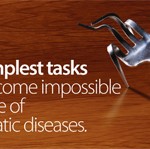The American College of Rheumatology (ACR) has covered a lot of ground since it launched its Simple Tasks campaign last September.
While still in its infancy, the campaign was designed to raise awareness of the severity of rheumatic diseases and to highlight the importance of rheumatologists in the diagnosis and treatment of such diseases.
“Our members have a lot to be proud of with this campaign,” says James R. O’Dell, MD, president of the ACR.
Over the past year, more than 3,000 people have viewed the Simple Tasks video on YouTube, and several other videos have been created. A dedicated campaign website has been launched (www.SimpleTasks.org), and more than 27 organizations have been asked to share the campaign with their constituents—to name just a few accomplishments. The campaign’s key image—a bent fork that resembles a hand with severe rheumatoid arthritis—also made its official debut on the Jumbotron in Times Square and has since been turned into a lapel pin. Members can get their own pin at the Simple Tasks booth in this year’s ACR/ARHP Annual Meeting Exhibit Hall.
“The pin is often recognized by lawmakers, who now associate the bent fork with Simple Tasks and the ACR,” adds Dr. O’Dell, who is also the director of the internal medical residency program and division chief of rheumatology at the University of Nebraska in Omaha. “I wear this pin regularly, and it has opened the door for many conversations about rheumatology and the importance of early and appropriate treatment by a rheumatologist.”
To further push the campaign nationwide, he says ACR members need to become more involved. He encourages them to share their medical knowledge and experiences in rheumatology with traditional and social media, author articles on related topics, and refer rheumatology patients who are willing to share their personal and inspiring stories to the ACR.
Meanwhile, he says the ACR will continue along its path of educating lawmakers, referring physicians and health care professionals, and others who influence rheumatology on the severity and impact of rheumatic diseases, as well as the critical role rheumatologists play in the treatment of those conditions.
“This campaign is ACR’s first large-scale public relations effort,” says Dr. O’Dell. “We have a lot of areas to cover in our future efforts.”

Early Diagnosis: Success
Among the campaign’s initial challenges was finding creative ways to reach out to multiple audiences that initially included lawmakers, referring physicians, and advocacy groups.
Early on, the ACR surveyed lawmakers and referring physicians, explains Erin Latimer, director of public relations at the ACR.
“We tested everything from our messages to our visual creative,” she says, adding that the campaign’s other images involve a bent toothbrush and bent key. “We tested about five concepts. We were able to massage the messaging to make it resonate with the different audiences.”
The ACR’s efforts were noticed. Simple Tasks earned three public relations awards. In 2012, the ACR’s white paper, “Rheumatic diseases in America: The problem, the impact, and the answers,” received the Hermes Creative Award, Platinum, while Simple Tasks’ communication plan—Enhancing the Perceived Value of Rheumatology—earned the Hermes Creative Award, Gold. In 2011, the campaign’s video production, “State of Rheumatology,” was also presented with the AVA Gold award.
By the campaign’s first birthday, Latimer says the ACR had established campaign support with numerous organizations, such as the Arthritis Foundation, Scleroderma Foundation, and American College of Physicians, to help spread Simple Tasks’ message.
The campaign has also supported the work of the Government Affairs Committee by supplying ACR advocates with campaign materials, leave-behinds, and Capitol Hill advertising, all with the Simple Tasks message: “The simplest tasks can become impossible because of rheumatic diseases.” The campaign also recently supported the ACR’s introduction of the Patients Access to Treatment Act, which is sponsored by David McKinley (R- W.Va.) and Lois Capps (D-Calif.), through media relations and advertising.
“We’ve done a good amount of work in a short time, and we’ve conducted a lot of outreach,” says Latimer, adding that Simple Tasks is nicknamed the influencer campaign. “We’re always thinking months in advance and looking for new ways to reach these important audiences.”
Greater Expectations
The ACR has even more ambitious plans for the campaign throughout 2013.
Referring physicians, rheumatologists, and other healthcare providers will be invited to participate in roundtable discussions facilitated by ACR members, says Eric Matteson, MD, chair of rheumatology at the Mayo Clinic in Rochester, Minn., and chair of the ACR’s Communications and Marketing Committee.
Besides focusing on the campaign’s current audiences, the ACR will conduct research into using public relations to reach medical students.
“We want to identify women and minorities who are interested in rheumatology to bring them into the field in greater numbers, which enhances our diversity and care so we’re able to provide [care] to diverse patient groups across the country,” says Dr. Matteson. “We also need to increase the number of pediatric rheumatologists, which is [now] an extremely small number.” Just as the campaign works with the Government Affairs Committee to support the ACR’s legislative priorities, it will work with the Committee on Workforce and Training to research this potential audience.
But until then, Dr. Matteson says the ACR isn’t sitting still. Its outreach efforts are extending into many different areas.
During the next year, for example, he says the ACR plans to use traditional and social media, advertising in such forums as medical journals and Capitol Hill publications, continued grassroots outreach to like-minded organizations, and a number of other tactics to help fuel the campaign. The ACR also plans to introduce new members of Congress to the organization, its legislative priorities, and the Simple Tasks campaign and develop CME-accredited rheumatology courses for referring physicians. Likewise, the ACR’s white paper about rheumatic diseases will be updated and disseminated to lawmakers and insurance companies and also posted on the Simple Tasks website for the general public.
“We envision this as an ongoing campaign,” says Dr. Matteson. “We see this as something that’s going to require constant attention and be actively pursued into the foreseeable future.”
To learn how you can become involved in the Simple Tasks campaign, visit www.rheumatology.org to access the members-only toolkit or e-mail Suzanne Forte at [email protected].
Carol Patton is a freelance journalist based in Las Vegas.
